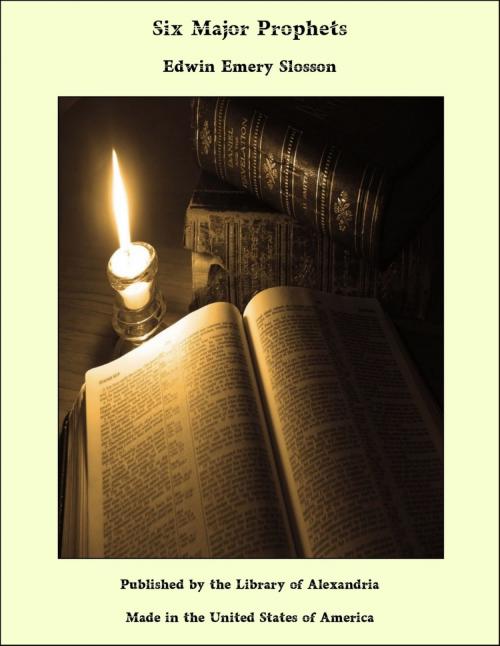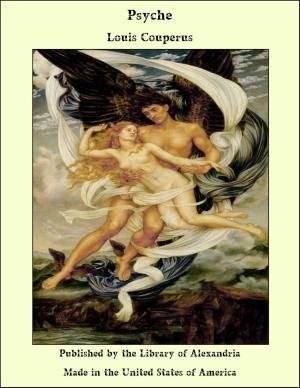| Author: | Edwin Emery Slosson | ISBN: | 9781465625984 |
| Publisher: | Library of Alexandria | Publication: | March 8, 2015 |
| Imprint: | Language: | English |
| Author: | Edwin Emery Slosson |
| ISBN: | 9781465625984 |
| Publisher: | Library of Alexandria |
| Publication: | March 8, 2015 |
| Imprint: | |
| Language: | English |
August 4, 1914, cuts time in two like a knife. The continuity of human progress in science, arts, letters, commerce, philosophy, everything, was broken off at that point—to be taken up again, who knows when? Nothing in the world can remain quite the same as before. Everything is seen in a new light. All our old ideas, even the most ancient and most reverenced, will have to be taken out and looked over to see how many of them remain intact and useful, just as after an earthquake one overhauls the china closet. "The transvaluation of all values", which Nietzsche looked for, has come to pass sooner than he expected, although the results of this reëstimation are not likely to be what he anticipated. It is not merely that the geographies will have to be revised and the histories rewritten, but all books will be classified as antebellum or postbellum literature. It will, however, not be necessary to mark them A. B. or P. B., for they will by their style of thought and language bear an indelible though invisible date with reference to this line of demarcation. We are already beginning to look back upon the antebellum days as a closed period, and those who were conspicuous in it are being seen in an historical perspective such as the lapse of a generation of ordinary times is needed to produce. Some reputations are shrinking, others are rising, as mountains seem from a departing train to rearrange themselves according to their true height. The true prophets are becoming distinguishable from the false. Among those who have taken the test and stand higher than before is George Bernard Shaw. Whether he will write better plays than before remains to be seen. Perhaps he will write no more of any kind. But those he has written will be regarded with more respect because we can see their essential truth, whereas before we feared lest we might be merely fascinated by their glitter. Warnings which the world took for jokes because of their fantastic guise now turn out too terribly real, and advice which the world ignored would better have been heeded. Few writers have as little to take back on account of the war as Shaw, although few have expressed such decided opinions in such extreme language on so many topics. For instance, Kipling's "The Bear that Walks Like a Man" makes queer reading now that England is fighting to give Russia what then she was ready to fight to prevent her getting. But the full significance of Shaw's fable farce of "Androcles and the Lion" is now for the first time being realized. The philosophy of this, his most frivolous and serious play, is summed up by Ferrovius, a converted giant of the Ursus type, who finds it impossible to keep to his Christian principle of nonresistance when brought into the arena. The natural man rises in him and he slays six gladiators single-handed. This delights the emperor, who thereupon offers him a post in the Pretorian Guards which he had formerly refused. The fallen and victorious Ferrovius accepts, saying: In my youth I worshiped Mars, the god of war. I turned from him to serve the Christian God; but to-day the Christian God forsook me; and Mars overcame me and took back his own. The Christian God is not yet. He will come when Mars and I are dust; but meanwhile I must serve the gods that are, not the God that will be. Until then I accept service in the Guard, Caesar. The great cataclysm does not seem to have changed Shaw's opinions one iota, but all England is changed, and so he appears in a different light. More of his countrymen agree with what he used to preach to them than ever before, yet he was never so disliked as he is to-day—which is saying a great deal. The British press has boycotted him. His letters, once so sought after by the most dignified journals, now no longer appear except in The New Statesman. His speeches, be they never so witty and timely, are not reported or even announced.
August 4, 1914, cuts time in two like a knife. The continuity of human progress in science, arts, letters, commerce, philosophy, everything, was broken off at that point—to be taken up again, who knows when? Nothing in the world can remain quite the same as before. Everything is seen in a new light. All our old ideas, even the most ancient and most reverenced, will have to be taken out and looked over to see how many of them remain intact and useful, just as after an earthquake one overhauls the china closet. "The transvaluation of all values", which Nietzsche looked for, has come to pass sooner than he expected, although the results of this reëstimation are not likely to be what he anticipated. It is not merely that the geographies will have to be revised and the histories rewritten, but all books will be classified as antebellum or postbellum literature. It will, however, not be necessary to mark them A. B. or P. B., for they will by their style of thought and language bear an indelible though invisible date with reference to this line of demarcation. We are already beginning to look back upon the antebellum days as a closed period, and those who were conspicuous in it are being seen in an historical perspective such as the lapse of a generation of ordinary times is needed to produce. Some reputations are shrinking, others are rising, as mountains seem from a departing train to rearrange themselves according to their true height. The true prophets are becoming distinguishable from the false. Among those who have taken the test and stand higher than before is George Bernard Shaw. Whether he will write better plays than before remains to be seen. Perhaps he will write no more of any kind. But those he has written will be regarded with more respect because we can see their essential truth, whereas before we feared lest we might be merely fascinated by their glitter. Warnings which the world took for jokes because of their fantastic guise now turn out too terribly real, and advice which the world ignored would better have been heeded. Few writers have as little to take back on account of the war as Shaw, although few have expressed such decided opinions in such extreme language on so many topics. For instance, Kipling's "The Bear that Walks Like a Man" makes queer reading now that England is fighting to give Russia what then she was ready to fight to prevent her getting. But the full significance of Shaw's fable farce of "Androcles and the Lion" is now for the first time being realized. The philosophy of this, his most frivolous and serious play, is summed up by Ferrovius, a converted giant of the Ursus type, who finds it impossible to keep to his Christian principle of nonresistance when brought into the arena. The natural man rises in him and he slays six gladiators single-handed. This delights the emperor, who thereupon offers him a post in the Pretorian Guards which he had formerly refused. The fallen and victorious Ferrovius accepts, saying: In my youth I worshiped Mars, the god of war. I turned from him to serve the Christian God; but to-day the Christian God forsook me; and Mars overcame me and took back his own. The Christian God is not yet. He will come when Mars and I are dust; but meanwhile I must serve the gods that are, not the God that will be. Until then I accept service in the Guard, Caesar. The great cataclysm does not seem to have changed Shaw's opinions one iota, but all England is changed, and so he appears in a different light. More of his countrymen agree with what he used to preach to them than ever before, yet he was never so disliked as he is to-day—which is saying a great deal. The British press has boycotted him. His letters, once so sought after by the most dignified journals, now no longer appear except in The New Statesman. His speeches, be they never so witty and timely, are not reported or even announced.















